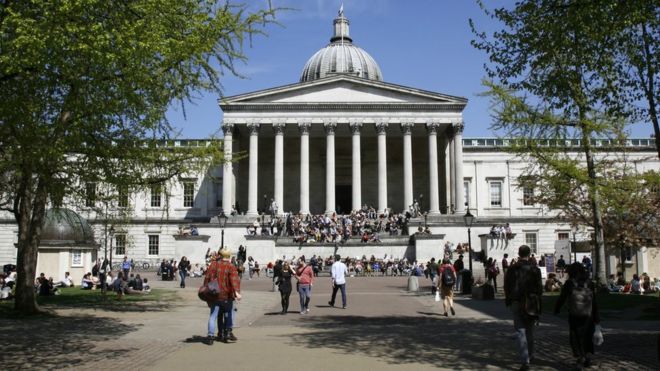UCL ban on staff-student relationships is 'a wake up call' - campaigners
 GETTY IMAGES
GETTY IMAGES
A ban on intimate relationships between staff and their students at University College London is "a wake up call" for universities, campaigners have said.
Student groups said they hoped similar policies would be adopted by other universities.
UCL is believed to be the third UK university to introduce a ban and the first from the Russell Group of 24 leading universities.
It said the policy aimed to prevent abuses of power and sexual misconduct.
Kelsey Paske, behaviour and culture change manager at UCL, said the policy also aimed to address any real or perceived conflict of interest arising from relationships "that may have adverse effects on the working and learning environment".
UCL's new personal relationships policy for employees, first reported by the Guardian, prohibits "close personal and intimate relationships between staff and students where there is direct supervision".
An intimate relationship between a staff member and a student who they do not directly supervise must be declared by staff too.
The policy also prohibits intimate relationships with staff or students who are under the age of 18 or adults who are "at risk", for example someone who may need care because of a disability.
Any breach of the policy will be investigated under the university's disciplinary procedure, which includes possible action ranging from a formal warning to dismissal.
- Universities 'failing' victims of sexual misconduct
- Cambridge don wrote erotic fiction about students
Dr Anna Bull, of the 1752 Group, which campaigns against sexual misconduct in higher education, said the group "strongly supported" UCL's new policy and hoped other universities would "follow suit".
She said the policy was the "most stringent in the UK", with only two other universities - Greenwich and Roehampton - having similar bans.
Dr Bull said most other universities only had policies which "strongly discouraged" sexual relationships between staff and students, which she said could mean staff were still allowed to ask students on dates or make romantic approaches.
"We think this is a real wake up call to the sector to start to take seriously their responsibilities for keeping students safe from potential abuses of power by staff," she said.
The National Union of Students (NUS) also welcomed the move.
NUS women's officer Rachel Watters said: "Given the public focus on sexual misconduct in higher education and elsewhere, we would hope and expect more universities to revise their policies in similar ways."
A 2018 survey of more than 1,500 students, conducted by the NUS and 1752 Group, found around 80% of respondents felt uncomfortable about sexual relationships between staff and students.
A spokesperson for Universities UK, which represents the sector, said: "All students and staff are entitled to a safe and positive experience and universities are committed to becoming safer places to live, work and study."
The organisation said it would be publishing guidance for universities on managing staff on student misconduct in the summer.

No comments:
Post a Comment